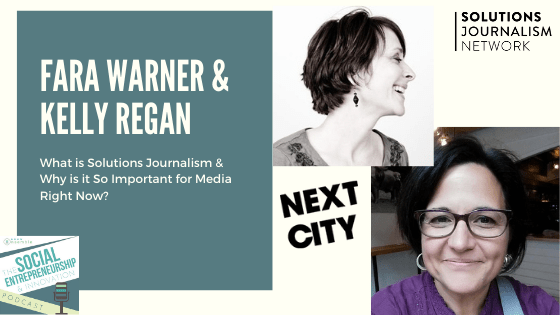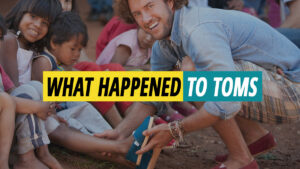With Fara Warner of the Solutions Journalism Network & Kelly Regan of Next City
Subscribe & Listen: Apple Podcasts – Spotify – YouTube

We spend around seven hours per day consuming content, a number that’s only increased since the start of the COVID-19 pandemic. Whether it’s news, Netflix, or social media, people are constantly reading, absorbing, and learning new information. Still, a 2019 study showed that 32% of people actively avoid the news. So, what is the content we’re taking in? What is it teaching us, and how does it inform our views and our mental health?
The Solutions Journalism Network is a nonprofit organization dedicated to supporting newsrooms and journalists who are sharing solutions stories. Solutions journalism outlines responses to social problems that aren’t only uplifting, they’re success stories that increase audience engagement and provide unique insight. As a society, we need these high-level, evidence-based reporting projects to help combat false information and encourage unity in a divided population.
What is Solutions Journalism?

Solutions journalism is evidence-based, solutions-oriented reporting that focuses on solutions to the world’s biggest social issues. Newsrooms and journalists practicing solutions journalism use rigorous evidence-based reporting to first bring attention to a particular solution to a global issue, and second, to provide a model of solutions for other cities, schools, or readers experiencing a similar issue.
Put simply, there’s a disconnect between learning about what’s wrong in the world (climate change, poverty, social inequity) and being able to do something about it. A journalist practicing solutions journalism is keenly aware of both the problem and solution and aims to connect readers to stories that provoke action, model change, and educate.
The Four Pillars of Solutions Journalism
The Solutions Journalism Network has a fantastic and free education lab for anyone interested in learning more about how to practice solutions-based reporting. The training describes four pillars that are key to grasping how solutions-oriented storytelling functions.
Focus on Response to Social Problem
The response should focus on a unique approach to solving an issue and be explained within the context of the issue. Furthermore, the story should elaborate on the actual performance of that solution and how it works.
Offering Insight
Exploring issues should automatically yield solutions and illuminate new questions. A good piece will bring the reader along as those solutions and questions are explored.
Use of Evidence
Any claim should be substantiated by adequate user data surrounding the issue. If there’s a lack of data surrounding a problem, that should be explored and shared with the audience.
Reporting on Limitations
No response to an issue is going to be perfect, so it’s necessary for a solutions story to share the downfalls of each response with the readers and dig into why the response has failed or could be improved.
Solutions Journalism Examples
Stories that employ techniques used in solutions journalism don’t all look the same, but they all use a similar approach. Next City, a nonprofit news organization based in Philadelphia, published a story in April titled “Syracuse Couldn’t Find a Way to Clear Sidewalks, So It’s Trying Something New.” Not only does this title appeal to likely audiences by presenting the problem, but it also hooks potential readers by implying that there is an innovative response to that problem.
The Power of Solutions Journalism
We’re all familiar with the power of storytelling and its ability to provoke empathy and even affect our brain chemistry, whether it’s amplifying the problems and solutions displayed in refugee stories or sharing a report of how sustainability in business is combating climate change.
As well as linking problems to impactful positive outcomes, reporting about responses and unique approaches to problems empowers readers to take action, makes them feel positive about the state of human ingenuity, and gives them a sense of connection to their immediate community.
Solutions Journalism Network: Supporting Journalists & Empowering Audiences

The Solutions Journalism Network is a nonprofit organization that supports newsrooms and journalists in practicing solutions storytelling. Founded in 2013 by Tina Rosenberg, David Bornstein, and Courtney Martin, the organization provides resources for anyone interested in learning more about the practice of solutions journalism.
The network is building community by connecting newsrooms across the globe who are crafting these solutions stories.
“We define solutions journalism as rigorous, compelling coverage of responses to social problems—reporting done with the highest of journalistic standards.”
Fara Warner, Business and Sustainability Initiative Manager at Solutions Journalism Network

Fara is an award-winning journalist and digital media pro. She’s written pieces that have been featured in The New York Times and The Daily Beast. Fara is also the co-founder of a journalism startup, A Picture’s Worth.
Currently, she leads the Business & Sustainability Initiative at Solutions Journalism Network (SJN). She works with newsrooms on reporting environment and climate stories through a solutions-focused reporting method.
Kelly Regan, Editorial Director at Next City

Kelly is the editorial director at Next City, a nonprofit news organization dedicated to elevating solutions that make cities more equitable, sustainable, and inclusive for everyone. She oversees content produced for the site across all platforms and manages funder relationships. Kelly’s career spans two decades in magazines, books, and digital publishing.
Next City is a partner of SJN. In their pieces, Next City strives to provide actionable responses to social issues through the practice of solutions journalism. Each story functions as a model or provides a way for another city to create a similar response or approach to a similar issue.
Check Out These Solutions Journalism Stories:
The solutions story tracker is an aggregated news source for readers to be inspired by changemaking work around the world. Here are some especially interesting stories to share:
- Article: Australia made a plan to protect Indigenous elders from covid-19. It worked.
- Article: How new technology is helping to identify human rights abuses in the seafood industry
- Video: How Banana Waste Is Turned Into Rugs, Fabric, And Hair Extensions
- Audio: Compost Can Save the Earth
Closing: From Problems to Action
With today’s news cycle, it’s easy to feel disheartened by the media. Push notifications on our phones mean we often see breaking news first thing in the morning, sometimes even before getting out of bed. Occasionally, that information is false or inaccurate.
While it’s important to be informed, sourcing solutions-oriented stories and cycling them into your normal media consumption routine will make a world of difference in how you view the world and the collective issues we face. You might even be inspired by a solution and move it forward in your own community! How can you see yourself embedding the practices of solutions journalism into your life?
Additional Resources & Links Mentioned in the Episode:
- Solutions Journalism Network on Twitter, Facebook, Instagram, and YouTube
- Know Your Price by Andre M. Perry
- Next City on Twitter, Facebook, and LinkedIn
- Next City’s Best Solutions of 2020
- You Are What You Read by Jodi Jackman
- Upcycled carpet tiles by FLOR

Jacqueline Goodwin
Sustainable Workplaces Manager & Writer
Jackie is the Sustainable Workplaces Manager at Urban Green Lab, a sustainability education nonprofit in Nashville, Tennessee. She’s passionate about connecting people with actionable ways to make a positive impact on the environment. She graduated from Dickinson College with a degree in Environmental Studies and a certificate in Social Innovation & Entrepreneurship. Jackie worked in the nonprofit world in Washington D.C. for Ashoka and the National Building Museum.
Jackie enjoys hiking with her rescue dog, finding craft breweries, and traveling the globe in search of plant-based eats.






Wooow Thank you for sharing best Ideas of developing our carrer of Jurnalism
This will bring development in the society
You got it – we’re as excited about the progress of Solutions Journalism as you are.
Thanks for reading/listening!
-Cory